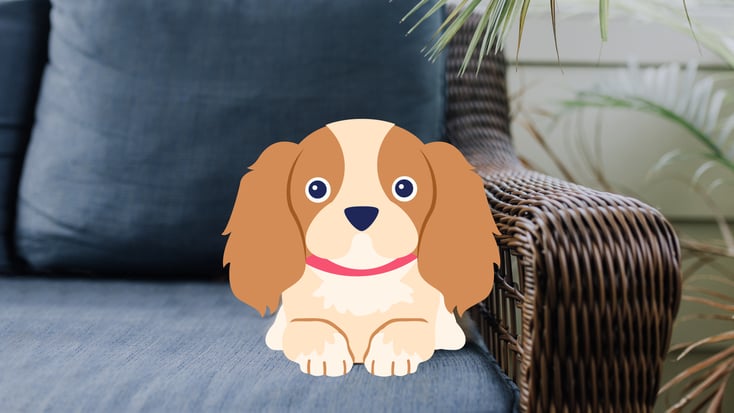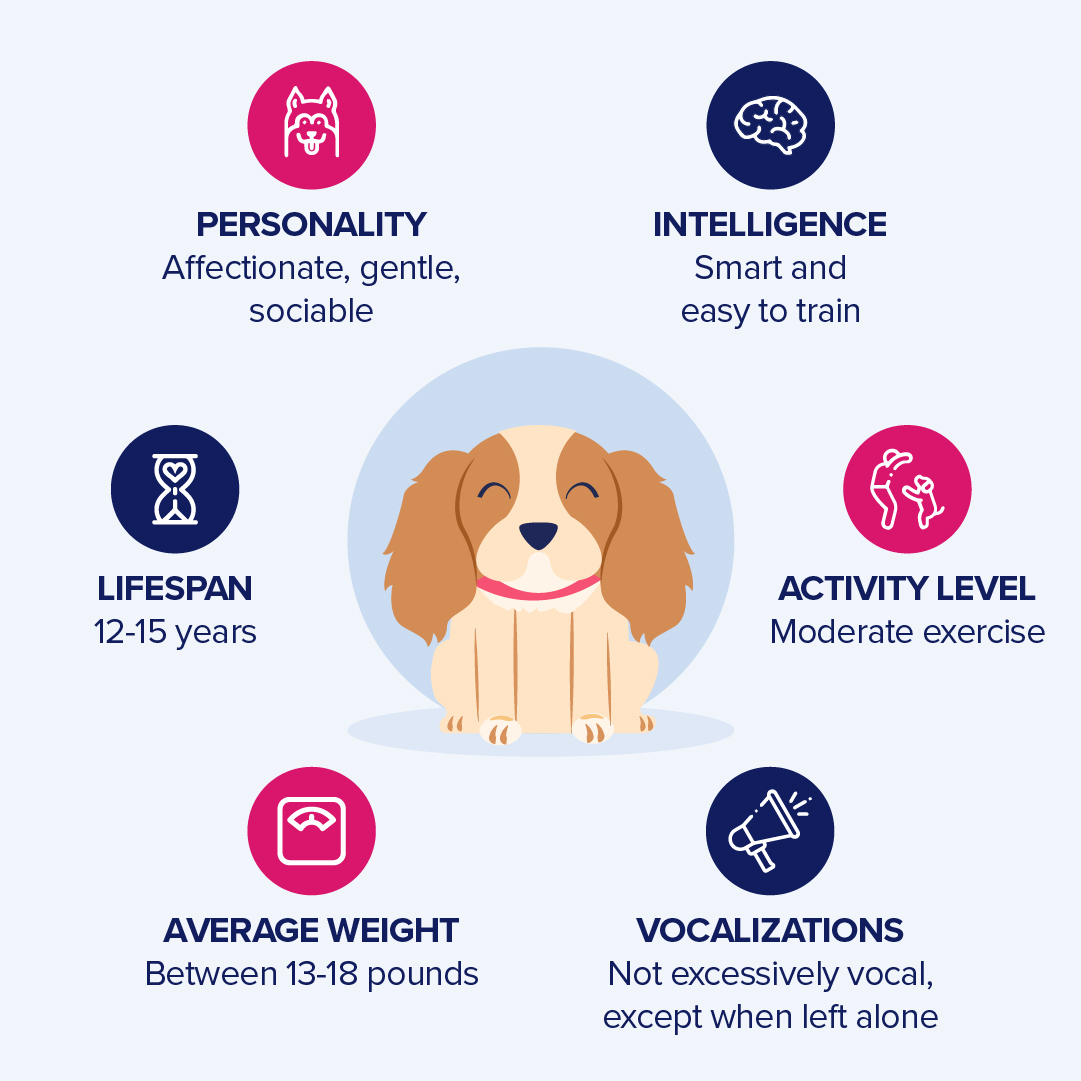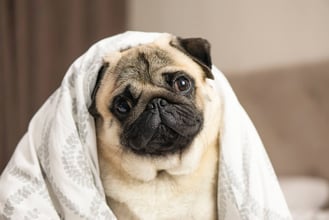Cavalier King Charles Spaniel Breed Information

Table of Contents
The Cavalier King Charles Spaniel is a charming toy breed with a rich history from 16th century England. Bred to be companion dogs, Cavaliers are known for their gentle nature, athleticism, and beauty. In this blog, we will delve deeper into this delightful breed's characteristics, temperament, and health. We'll also examine their friendly and adaptable personalities, making them excellent companions for families, children, and other pets.
The History of the Cavalier King Charles Spaniel
As a breed favored by royalty, the Cavalier King Charles Spaniel has a long and fascinating history that can be traced back to Renaissance Europe. In the 17th century, the breed gained its name after King Charles II's love for the black and tan toy spaniel. Over the years, the breed evolved, and in the 19th century, it was crossed with Asian toys, creating a flatter-faced English Toy Spaniel.
In the 1920s, a group of passionate dog enthusiasts set out to revive the classic spaniels of King Charles II's era, which eventually led to the development of the Cavalier King Charles Spaniel breed. The "cavalier" in the breed's name is believed to have been inspired by the army that supported King Charles I in the English Civil War, known as the Cavaliers.
The Cavalier King Charles Spaniel has been growing in popularity since gaining recognition by the Kennel Club in the UK in 1945 and the American Kennel Club in 1995. Known for their adorable appearance and friendly nature, these dogs have captured the hearts of many dog lovers around the world.

Physical Characteristics
The Cavalier King Charles Spaniel is a little superstar in the dog world, combining a compact yet sturdy build with an elegant and graceful appearance. With their silky, flowing coats, long drooping ears, and big, soulful eyes, they are impossible to resist. These pups have a distinctive head shape with a slightly rounded skull and a short, well-proportioned muzzle that gives them a friendly, approachable expression. And let's not forget about their tail – it's moderately long and usually held straight up, adding to their regal bearing.
In terms of weight and size, the Cavalier King Charles Spaniel is a small dog breed, typically weighing between 12 and 18 pounds and standing around 12 to 13 inches tall at the shoulder. Their coats come in four beautiful colors: tri-color (black, white, tan), black and tan, Blenheim (chestnut and white), or ruby.
Temperament and Personality
These are excellent companion dogs. The Cavalier King Charles Spaniel's temperament is warm and gentle. This makes it a great choice for families with children or other pets. They are playful and affectionate, always ready for a good cuddle or game of fetch, but they are also adaptable to their pet parent's lifestyle and can be just as content lounging on the couch.
Cavaliers are social butterflies and enjoy meeting new people and pets. They get along well with children and are patient with their playful antics, making them great family dogs. With their friendly nature, Cavaliers may not make the best watchdogs, but they make up for it with their sweet and outgoing personality.
As a small breed, Cavaliers have moderate exercise needs and enjoy daily walks and playtime in the yard. They are not overly active and are content with moderate exercise, making them an excellent choice for families living in apartments or tiny homes. However, keeping them on a leash or in a securely fenced area is important, as they naturally tend to chase small animals.
Health Issues
Cavalier King Charles Spaniels are generally healthy dogs, but like all breeds, they are prone to some specific health issues. These include certain eye conditions (including retinal problems and cataracts), patella luxation, hip dysplasia, middle ear infections, mitral valve heart disease, and a neurological condition called syringomyelia.
To help reduce the risk of these and other health issues, it's recommended that you schedule your Cavalier for regular health screenings, such as cardiac exams, patella and hip evaluations, and ophthalmologist evaluations.
The average lifespan of a Cavalier King Charles Spaniel is around 12 to 14 years, but with proper care, some have been known to live into their late teens. A balanced diet, regular exercise, and routine veterinary care can all help promote a long and healthy life for your furry friend.
Training and Grooming
Cavaliers are intelligent and eager to please, making them easy to train with positive reinforcement methods such as food rewards and praise. Their gentle personality means that harsh discipline is ineffective and can harm their training. Socialization and obedience training are also crucial to help your Cavalier become a well-adjusted and happy family member.
Cavaliers have a medium grooming requirement, with their silky coats needing regular brushing to prevent matting and tangling. They shed moderately, so grooming can help minimize shedding. Regular ear cleaning is important to prevent infections, and nails should be trimmed monthly to avoid pain and structural issues. Grooming sessions are an excellent opportunity to bond with your Cavalier and check for new bumps or issues.
Like all breeds, Cavaliers have breed-specific traits that should be considered when deciding if they fit your family. They are social dogs who enjoy being around their human family and can suffer from separation anxiety if left alone for long periods.
Final Thoughts
The Cavalier King Charles Spaniel is an excellent choice for those seeking a devoted and affectionate companion. They make lovely pets for families, seniors, and anyone who wants a loyal friend. Whether you're an experienced dog owner or a first-time pet parent, the Cavalier's adaptable and easygoing temperament makes them a great addition to your life.
Frequently Asked Questions
How much is a Cavalier King Charles Spaniel?
Cavalier King Charles Spaniels can vary in price depending on their age, breeder, location, and pedigree. A puppy from a reputable breeder can cost anywhere from $1,800 to $3,500. It's essential to find a responsible breeder who prioritizes the health and well-being of their dogs. Adopting a Cavalier King Charles Spaniel from a rescue organization or shelter can be more affordable, with adoption fees typically ranging from $250 to $500.
Are Cavalier King Charles Spaniels hypoallergenic?
No, Cavalier King Charles Spaniels are not hypoallergenic. They shed moderately and produce dander like all other dogs, which can trigger allergies in sensitive individuals. However, people with mild allergies may still be able to tolerate being around Cavaliers. Regular grooming and cleaning can also help reduce allergens in the home.
Do Cavalier King Charles Spaniels shed?
Yes, Cavalier King Charles Spaniels do shed. Their medium-length, silky coat requires regular grooming to keep it healthy and tangle-free. Cavaliers are considered moderate shedders, which means they shed seasonally, typically in the spring and fall, but may also shed throughout the year.
How big do Cavalier King Charles Spaniels get?
Cavalier King Charles Spaniels are a small to medium-sized breed. According to the American Kennel Club (AKC), their height should be between 12 to 13 inches at the shoulder, and their weight should be between 13 to 18 pounds. However, some Cavaliers can be slightly larger or smaller than these measurements.
Do Cavalier King Charles Spaniels bark a lot?
Cavalier King Charles Spaniels are generally not excessive barkers but may bark to alert their owners to visitors or strangers. However, they are known for their friendly and sociable nature and are not suited to be guard dogs.







